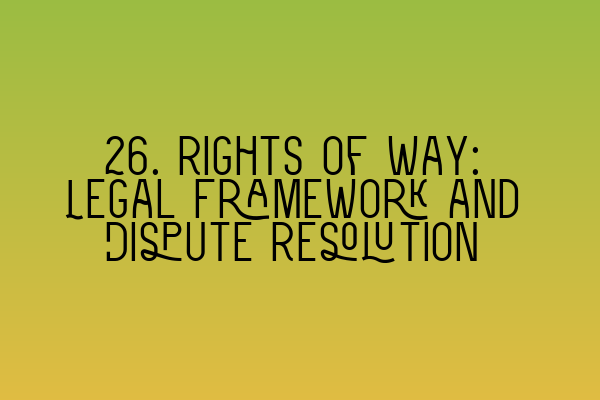26. Rights of Way: Legal Framework and Dispute Resolution
At SQE Property Law & Land Law, we understand the importance of rights of way in property ownership and development. Whether you are a landowner, developer, or someone seeking access to a property, it is crucial to have a clear understanding of the legal framework surrounding rights of way and the dispute resolution mechanisms available.
In this blog post, we will provide an in-depth overview of the legal principles governing rights of way, explore common disputes that may arise, and discuss the resolution options available to parties involved. Before diving into the details, let’s start with a brief definition.
What is a Right of Way?
A right of way is a legal easement that grants a person or entity the right to pass through or use another person’s land for a specific purpose, typically for accessing a property or a public road. It can be established through various means, such as express grant, implied grant, necessity, or prescription.
Now let’s delve into the legal framework surrounding rights of way.
Legal Framework
The legal framework governing rights of way varies between jurisdictions, but in England and Wales, it is primarily regulated by the Land Registration Act 2002 and the Law of Property Act 1925.
The Land Registration Act 2002 introduced significant changes to the registration of rights of way. It requires all new rights of way to be registered with the Land Registry, ensuring transparency and reducing the risk of disputes.
The Law of Property Act 1925 sets out the principles governing the creation, interpretation, and enforcement of rights of way. It establishes that a right of way can be express, implied, or acquired through long use (prescription).
Common Disputes
Disputes relating to rights of way can arise due to various reasons and can be a highly contentious matter. Some common disputes include:
- Interference with the right of way: This may involve physical obstructions, such as gates, fences, or structures, preventing access to the right of way.
- Abuse of the right of way: This occurs when the party exercising the right of way exceeds its authorized use, causing damage to the landowner’s property.
- Disputed existence or extent of the right of way: Parties may disagree on the existence or boundaries of a right of way, leading to legal conflicts.
- Maintenance and repair responsibilities: Unclear or disputed responsibilities for maintaining and repairing the right of way can give rise to disputes.
Resolution Options
When disputes over rights of way arise, parties have several resolution options available to them. These include:
- Negotiation: Parties can attempt to resolve their differences through mutual agreement, often with the assistance of legal counsel or mediators.
- Meditation: Mediation involves the use of an impartial third party to facilitate negotiations between the parties and help them reach a mutually acceptable solution.
- Arbitration: Arbitration is a more formal process where an independent arbitrator is appointed to make a binding decision on the dispute.
- Litigation: If all other methods fail, parties can resort to litigation and seek a resolution through a court process. Court proceedings can be costly and time-consuming, so it is often considered a last resort.
It is important to note that the most effective resolution option will depend on the specific circumstances of each case. Seeking professional legal advice is always recommended to ensure the best course of action is taken.
Conclusion
Rights of way play a vital role in property ownership and development. Understanding the legal framework surrounding rights of way and the options for dispute resolution is essential for all parties involved. Whether you are seeking to assert your rights or defending against a claim, our team at SQE Property Law & Land Law is here to provide expert guidance and representation.
For further information, please refer to our related articles:
- SQE 1 Practice Exam Questions
- SQE 1 Practice Mocks FLK1 FLK2
- SQE 2 Preparation Courses
- SQE 1 Preparation Courses
- SRA SQE Exam Dates
Contact SQE Property Law & Land Law today to discuss your rights of way requirements and ensure your interests are protected.
